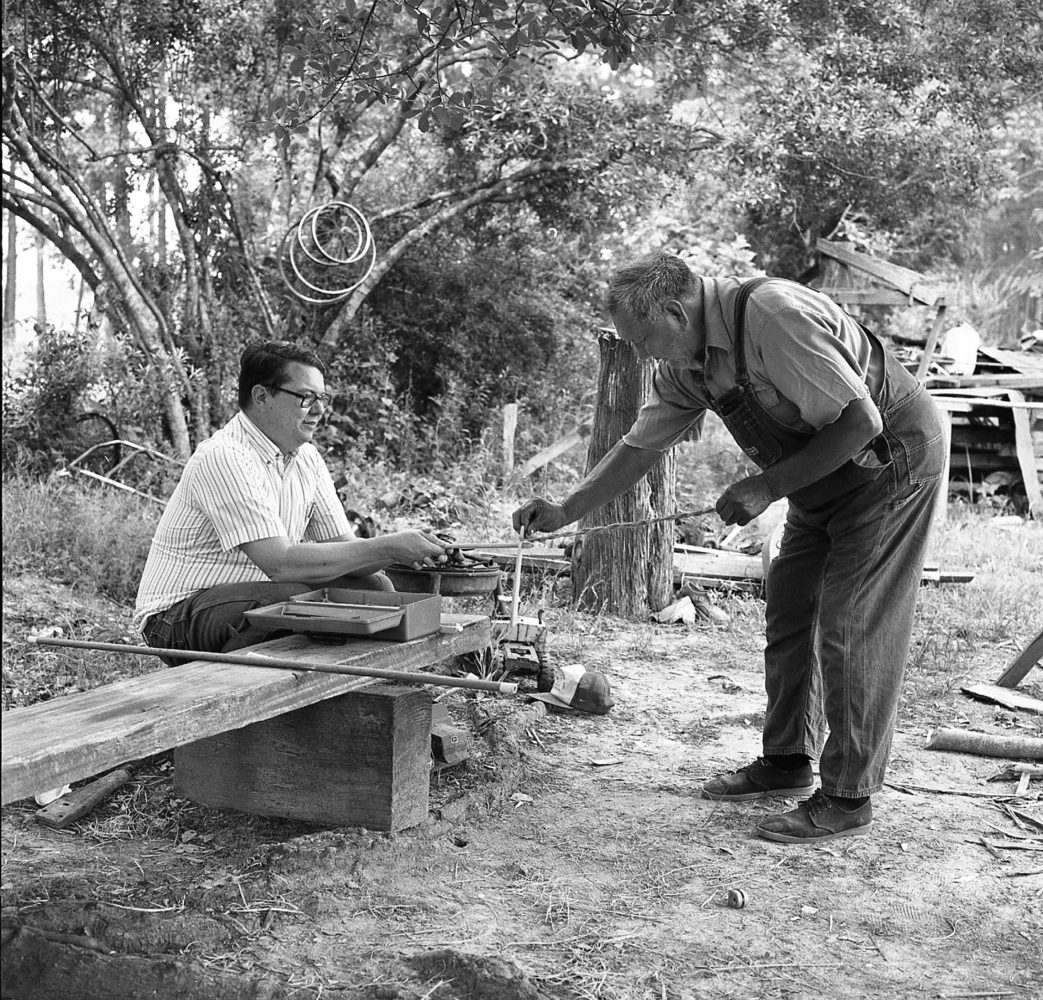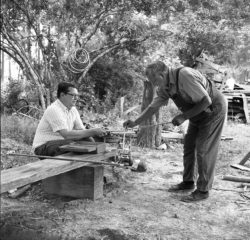A Resource Rich and Varied
Dr. Hiram F. Gregory receives award for Lifetime Contributions to the Humanities
Published: March 1, 2019
Last Updated: June 12, 2023

Photo by Don Sepulvado.
Coushatta traditionalist and teacher Bel Abbey and Hiram “Pete” Gregory spinning horsehair rope and telling tales at Bel’s house in the late 1970s.
“To every generation of its residents Louisiana has offered resources both rich and varied.”
So begins chapter one of The Historic Indian Tribes of Louisiana: From 1542 to the Present, a book co-authored by Fred B. Kniffen, George A. Stokes, and this year’s winner of the Louisiana Endowment for the Humanities’ Lifetime Contributions to the Humanities Award, Dr. Hiram F. “Pete” Gregory.One look at Gregory’s curriculum vitae makes it clear that his knowledge of Louisiana’s cultures is as rich and varied as the state’s own landscape. He’s spent his career working alongside groups like the Tunica–Biloxi Tribe, the Jena Band of Choctaw Indians, and the Caddo Nation, and after nearly sixty years of service at Northwestern State University (NSU), he continues to teach full-time. He is also the academic advisor of the Louisiana Creole Heritage Center and the curator for NSU’s Williamson Museum, which houses a collection of more than one hundred thousand artifacts, including arts and crafts from forty-one different tribes of the southeastern United States. In 2016, Lieutenant Governor Billy Nungesser and the Louisiana Office of Cultural Development recognized him as Louisiana’s Archaeologist of the Year.
Jeffrey Girard, one of Gregory’s former colleagues at NSU and the 2015 Louisiana Archaeologist of the Year, said, “Whenever I encounter an aspect of Louisiana culture with which I am unfamiliar, whether it concerns people, places, art, history, technology, you name it—I know that Pete will have some familiarity and in many cases detailed expertise, and he will take the time to share his knowledge.”
Many of Gregory’s other colleagues and contemporaries note that The Historic Indian Tribes of Louisiana, published in 1987 by Louisiana State University Press, still functions as a go-to introductory text to the field. When asked why that might be, Gregory said, “There’s not another one like it. . . . The people I work with are frequently people that other people don’t work with and don’t spend time with.”
Despite a long list of accolades and awards, Gregory continues to be surprised by each one. “It’s just what I do. It always surprises me if someone thinks it’s remarkable,” he said, referring to his work. “The American Indians I work with have been remarkable teachers. I have a couple of college degrees, but some of my best teachers have been people sitting on their front porch.”
One function of the humanities is to interpret cultures and experiences for a wider audience to understand. In that respect, Gregory’s career has been in service to the humanities. He has made information about American Indians more accessible not only to academic audiences and the general public but also to the tribes themselves.
“More than forty years ago, Pete developed friendships with members of the modern Caddo Nation and invited them to the Caddo Conference, a scholarly meeting previously attended primarily by archaeologists and historians,” said Girard. “The Caddos have attended every meeting since. Not only has this provided the Caddos with information about ongoing academic research about their past, but it also has enhanced researchers’ appreciation that the artifacts and documents they study relate to actual human lives, to cultures that endure to this day.”
“All of these people have loud, clear voices,” Gregory said of the different groups that he’s collaborated with. “They all have things to say, and they say them well for themselves. We have to give them a venue, a place in larger society. . . . Anthropology is supposed to do that. That’s our job, and that’s our pleasure.”
—
Hiram Ford “Pete” Gregory was born in Vidalia, Louisiana and grew up in Ferriday. He graduated from LSU and began teaching at Northwestern State University in Natchitoches in 1961. He curates the Williamson Museum, serves as the academic advisor for the Louisiana Creole Heritage Center, the Louisiana Folklife Festival, and the Folklife Center at Northwestern, and continues to enjoy teaching, listening, and learning.
—
Celebrate Dr. Gregory and all of the 2019 Humanities Award winners on April 4 at the Bright Lights Awards Dinner in Lafayette. For more information and tickets, visit www.leh.org/brightlights.
